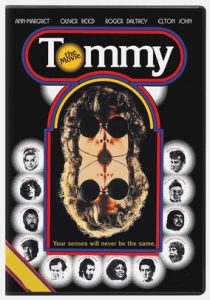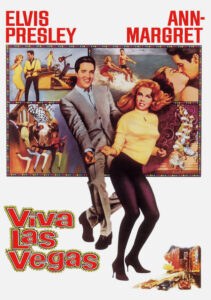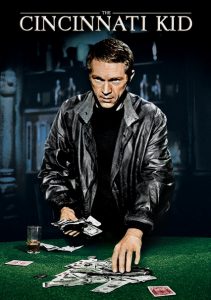Tommy-1975
Director Ken Russell
Starring Roger Daltrey, Ann-Margret
Top 250 Films #140
Scott’s Review #617
Reviewed February 15, 2017
Grade: B+
The film version of Tommy (1975) is a musical fantasy, rock opera based on the famous album recording by The Who in 1969.
Composed and adapted by The Who member Pete Townsend, the film tells the story of a deaf, dumb, blonde kid named Tommy.
Featuring a star-studded cast of actors and singers performing musical numbers, the film is an over-the-top treat and quite campy late-night fare. The stage version is usually a bit more serious and sedate than the film.
I enjoy the film but it pales in comparison to the stage versions- which I was fortunate enough to see at my local community theater recently.
The film is directed by Ken Russell.
Set during the 1940s and told mainly through song, we see a montage of Captain Walker (Robert Powell) and his wife Nora (Ann-Margret) on their honeymoon and Walker subsequently being sent off to war leaving a pregnant Nora behind.
When his fighter plane is shot down and he is presumed dead, the montage skips ahead five years, and Nora is now involved in a relationship with Frank (Oliver Reed).
Tommy is five years old and is visited by his father, who is very much alive. After a struggle with Frank and Nora, Powell is killed and a traumatized Tommy is unable to speak, see, or hear (except within his mind) as Frank and Nora are desperate to make sure he keeps quiet.
As Tommy grows into a young man, he becomes a “Pinball Wizard”, a prodigy at pinball, creating great wealth for Nora and Frank. Still unable to speak or see, he is first abused by his Uncle and Cousin but then championed as they are all able to get rich off of his abilities.
Through the years Nora and Frank attempt to “cure” Tommy of his ailments via a preacher (Clapton) leading a Marilyn Monroe cult and a prostitute (Turner).
The joy in Tommy (the film) is seeing the star-studded cast- Elton John, Tina Turner, and Eric Clapton, as well as Roger Daltrey, bring a sense of wonderment to the film. Who doesn’t like to see rock stars perform?
Famous actors Jack Nicholson, Ann-Margret, and Reed are featured.
The musical numbers are the splendid part of the film and one must be prepared to escape into a world of fantasy. Musical highlights for me include, “Acid Queen”, “It’s A Boy”, and “We’re Not Gonna Take It”.
My most recent viewing of the film Tommy disappointed me slightly, and this may be due to recently seeing the stage version- far superior in my mind.
Ann-Margret, while superb and believable as Tommy’s mum, is not the character that Townsend had in mind.
Sultry and sexy, she is cast to bring some sex appeal- nothing wrong with this, but the stage character is more of a working-class woman and more in line with the rest of the cast.
The film also seems a bit too over the top almost silly at times. But Tommy is an escapist film- based on the album, which is more serious.
I wonder if Russell was going for a more late-night, Rocky Horror Show or Little Shop of Horrors type of feel.
Tommy (1975) has its place, certainly, but I would first recommend the stage or the album version as a starting point and move to the film as escapist fare.
Oscar Nominations: Best Actress-Ann-Margret, Best Scoring: Original Song Score and Adaptation or Scoring: Adaptation


